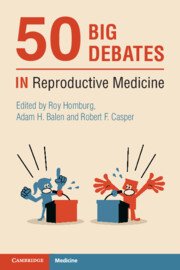Book contents
- 50 Big Debates in Reproductive Medicine
- Series page
- 50 Big Debates in Reproductive Medicine
- Copyright page
- Contents
- Contributors
- Foreword
- Introduction
- Section I Limits for IVF
- Section II IVF Add-ons
- Section III The Best Policy
- Section IV Embryology
- 24A ICSI Should Be Used for All IVF Cycles
- 24B ICSI Should Be Used for All IVF Cycles
- 25A Embryo Morphokinetic Analysis (Time-Lapse Imaging) Is Helpful in Selecting Euploid Blastocysts
- 25B Embryo Morphokinetic Analysis (Time-Lapse Imaging) Is Helpful in Selecting Euploid Blastocysts
- 26A Time-Lapse Imaging Should Be a Routine Procedure in Clinical Embryology
- 26B Time-Lapse Imaging Should Be a Routine Procedure in Clinical Embryology
- 27A Artificial Intelligence Is Useful for Embryo Selection in IVF
- 27B Artificial Intelligence Is Useful for Embryo Selection in IVF
- 28A There Is No Need to Take Embryos Out of the Incubator until the Day of Embryo Transfer
- 28B There Is No Need to Take Embryos Out of the Incubator until the Day of Embryo Transfer
- 29A Blastocyst Culture Should Be a Routine in All IVF Cycles
- 29B Blastocyst Culture Should Be a Routine in All IVF Cycles
- Section V Ethics and Statistics
- Section VI Male-factor Infertility
- Section VII Genetics
- Section VIII Ovarian Stimulation
- Section IX Hormones and the Environment
- Index
- References
24A - ICSI Should Be Used for All IVF Cycles
For
from Section IV - Embryology
Published online by Cambridge University Press: 25 November 2021
- 50 Big Debates in Reproductive Medicine
- Series page
- 50 Big Debates in Reproductive Medicine
- Copyright page
- Contents
- Contributors
- Foreword
- Introduction
- Section I Limits for IVF
- Section II IVF Add-ons
- Section III The Best Policy
- Section IV Embryology
- 24A ICSI Should Be Used for All IVF Cycles
- 24B ICSI Should Be Used for All IVF Cycles
- 25A Embryo Morphokinetic Analysis (Time-Lapse Imaging) Is Helpful in Selecting Euploid Blastocysts
- 25B Embryo Morphokinetic Analysis (Time-Lapse Imaging) Is Helpful in Selecting Euploid Blastocysts
- 26A Time-Lapse Imaging Should Be a Routine Procedure in Clinical Embryology
- 26B Time-Lapse Imaging Should Be a Routine Procedure in Clinical Embryology
- 27A Artificial Intelligence Is Useful for Embryo Selection in IVF
- 27B Artificial Intelligence Is Useful for Embryo Selection in IVF
- 28A There Is No Need to Take Embryos Out of the Incubator until the Day of Embryo Transfer
- 28B There Is No Need to Take Embryos Out of the Incubator until the Day of Embryo Transfer
- 29A Blastocyst Culture Should Be a Routine in All IVF Cycles
- 29B Blastocyst Culture Should Be a Routine in All IVF Cycles
- Section V Ethics and Statistics
- Section VI Male-factor Infertility
- Section VII Genetics
- Section VIII Ovarian Stimulation
- Section IX Hormones and the Environment
- Index
- References
Summary
As IVF moved from an NHS-supported activity in the UK to private free-standing facilities, fees and careful financial management were required. The underlying fertility profiles became expanded and the age-range of patients were extended. To avoid patient anguish if a live birth was not achieved, IVF clinics moved away from natural cycles to increasingly orchestrated regimens including manipulations. The ICSI procedure was initially introduced for male factor due to suboptimal semen profiles, but soon expanded to cases of surgical sperm recovery, thereafter to non-male factors including unexplained infertility, followed by ‘precious’ scenarios to avoid the risk of failed fertilisation. Concerns that ICSI by-passes the numerous physiological processes of natural fertilisation remain, but worldwide application over more than 25 years indicates that the technique does not cause congenital or developmental abnormalities. Applying an IVF-ICSI Split model for new cases with unexplained infertility optimises blastocyst numbers with an ICSI rate of ~90%.
- Type
- Chapter
- Information
- 50 Big Debates in Reproductive Medicine , pp. 126 - 127Publisher: Cambridge University PressPrint publication year: 2021



